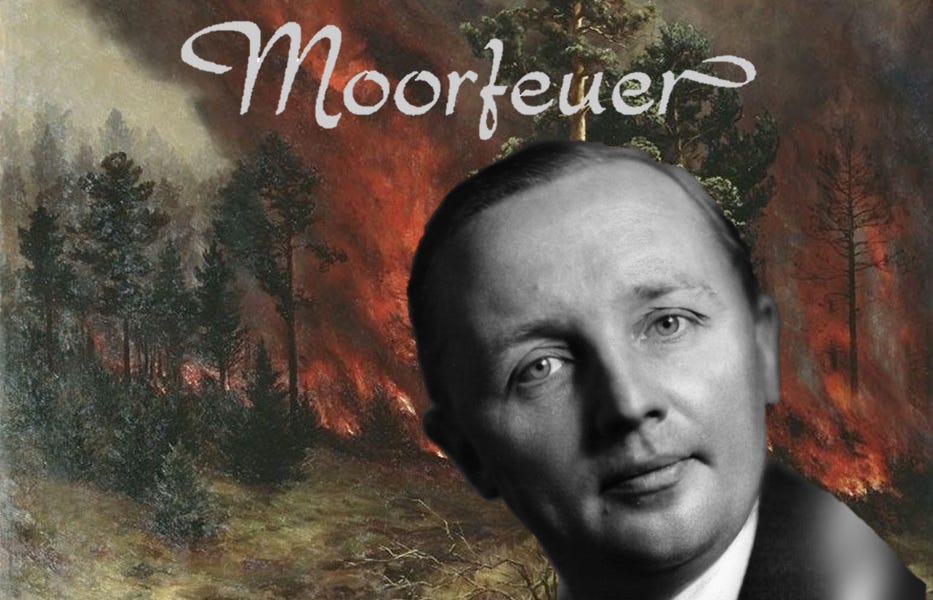Title: Fire in the Marshes [de: Moorfeuer]
Author(s): Johann Jakob von Leers
“Der Weg” Issue: Year 5, Issue 01 (January 1951)
Page(s): 50
Dan Rouse’s Note(s):
Der Weg - El Sendero is a German and Spanish language magazine published by Dürer-Verlag in Buenos-Aires, Argentina by Germans with connections to the defeated Third Reich.
Der Weg ran monthly issues from 1947 to 1957, with official sanction from Juan Perón’s Government until his overthrow in September 1955.
Selectively quoting Wikipedia:
Johann Jakob von Leers was an Alter Kämpfer and an honorary Sturmbannführer in the Waffen-SS in Nazi Germany, where he was also a professor known for his anti-Jewish polemics. He was one of the most important ideologues of the Third Reich, serving as a high-ranking propaganda ministry official. He later served in the Egyptian Information Department, as well as an advisor to Gamal Abdel Nasser. He published for Goebbels, in Peron's Argentina, and for Nasser's Egypt.
This article is signed “Lager Darmstadt, 1946”, indicating that it was written while von Leers was in American custody in the Darmstadt denazification internment camp.
The poem has been interpreted with music.
Source Document(s):
[LINK] Scans of 1951 Der Weg Issues (archive.org)
Fire in the Marshes
Johann Jakob von Leers
Unter dem Moor, wo der Torf in der schwarzdunklen Tiefe steht, Knisternd, mit glühenden Funken, rotdüster das Feuer geht. Rauch quillt gelbweiß nach oben, beißend steht Ruch überm Land, Grellhoch flammt trockener Ginster, glühheiß brennt der Sand.
Beneath the moor, where the peat lies thick in shadowy depths, a fire crackles to life, its glowing sparks casting a dusky red hue. Smoke rises in thick, yellow-white plumes, its sharp, biting scent cloaking the land. Flames flare high, devouring dry gorse with fierce hunger, while the sand beneath burns with a searing glow.
Unter der Erde rennt es, knistern sprühende Flammen in Hast, Aufbrennt wie steile Fackel der totmorsche Weidenast. Moorfeuer geht eiligen Fußes, Brandqualm zieht ihm voran, Moorfeuer läuft unterm Boden — niemand es löschen kann.
Underground, the blaze races, spitting and snapping in its frantic rush, setting dead willow branches ablaze like towering torches. The moor fire moves with relentless speed, its smoky herald streaking ahead. It burrows beneath the earth—no one can stop it.
Hier und dort zuckt eine Flamme, hellrot gierig sie glüht, Unter der Erde braust es, Moorfeuer weiter zieht. Moorfeuer kann man nicht löschen, es glostet Tag und Nacht, Kommen die wilden Stürme, Moorfeuer brausend erwacht.
Flames flicker here and there, greedy and crimson, while a deep roar rumbles below as the fire presses on. Unquenchable, it smolders day and night. When wild storms sweep in, the moor fire awakens with a thunderous bellow.
Aufschlagend krönen die Flammen die Bäume mit feuriger Kron; Gellend lacht jagende Windsbraut den keuchenden Löschern Hohn. Moorfeuer steigt aus der Erde, steil auf die Flamme saust, Sturm trägt hoch sie zum Himmel, wild übers Land sie braust ...
Tongues of flame leap upward, crowning the trees with blazing wreaths, while the wind—shrill and mocking—laughs at the breathless souls who dare to fight it. From the earth, the fire surges, its steep flames roaring skyward, swept high by the storm to rage wildly across the land.
Moorfeuer läuft unter der Erde, niemand es löschen kann; Moorfeuer ist geduldig, doch sein lohender Tag kommt heran!
Beneath it all, the moor fire runs on, untamed and unstoppable. Patient as the ancient peat, it waits—yet its day of blazing glory will come.





